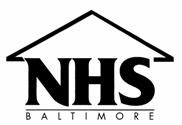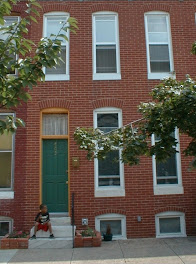By: Raevyn Jones, Marketing Coordinator, NHS of Baltimore
It should come as no surprise to anyone that there are many benefits to saving money at a young age. Children can use this money to save for college, back-up savings for adulthood, or even to buy their first car. Although saving money is not easy, it may be easier to for children to risk the temptations than adults.
With the current state of our economy, many kids are making the decision to save money at a young age. I believe that as soon as children begin to receive allowance, parents should initiate a savings plan. This plan should consist of long term goals and short term goals.
The first step to saving money is setting a savings goal. This goal will determine how much you save every week or bi-weekly when you receive your allowance. An effective way to determine your savings goal is to figure out how much you want to have by a certain date. For example if you want to save at least $300 a year, your savings goal would be roughly $25 per month.
After the savings goal is initiated, parents should open up a savings account for their child. Because of the lower fees credit unions offer, this may be the better option for a child’s savings account. Credit Unions also serve as the better option because the parents must be with the children if they want to withdraw money.
As an alternative to getting an allowance, teens may want to consider other ways to make money. Some of these options may include babysitting, lawn mowing, selling baked goods, shoveling snow, flyer distribution, selling Avon products, or summer positions with organizations like YouthWorks.
A big help to ensure that children will save money is for parents to be role models to their children. Parents may want to sit down with their kids and discuss with them the benefits of saving. For example, statistics on how much quicker a person can buy a house based off the money they save or being able to travel out of the country. Also, taking a financial fitness course with your teenage child could be a big help. This financial fitness class will teach your kids how to manage money while still living on a budget, most importantly the class is free of charge.
Regardless of how old one is, financial fitness will always be an important factor. The earlier children understand this, the better off they will be in the long run. For more information about Financial Fitness courses, please contact Neighborhood Housing Services of Baltimore.
Wednesday, January 26, 2011
Tuesday, January 4, 2011
BE TAXWISE!
By: Operations Department, NHS of Baltimore
As a new year begins, this is the time to begin thinking of how to be financially savvy and save for your rainy day. Knowing the Ins and Outs to building assets for your family’s future - even your own - is critical during these rough times. As such, participate in a financial fitness workshop to find new and innovative ways to shop, save and invest. But while thinking about your future, stop by our office to get your taxes prepared and to receive information about literacy workshops. At our site, we will offer clients (those making below $49,000) the opportunity to open savings accounts, purchase savings bonds and receive direct deposit of their refund into their accounts. The service is FREE through the Baltimore CASH Campaign!
Now that the new year has started, its time for families and individuals to pull out those well organized receipts and hoarded papers from 2010. While this may be a cumbersome task, at least you will see a benefit from your madness. For those who are not itemizing this year; your process is plain and simple, just present the W2(s) and Social Security Cards for you and your dependents. For incentives this year, there will be the usual Earned Income Credit, Child Tax Credit and Dependant Care Expense. And, Homeowners who have gone through foreclosure will have the opportunity to write off their debts – to include credit cards. This can only happen if your Lender/Creditor has cancelled your debt to which you would have received a letter or statement showing the amount written off. Another incentive is Energy Efficiency; if you purchased and installed an energy efficient furnace, windows, doors, air conditioning units, etc. you may qualify for a credit this year. You MUST have all receipts to document your purchase and installation.
Where there is good news, there is Bad news. First-time homeowners that received an $8000 credit in 2008; now is the time to begin paying back that money. It can be done in installments over a period of time until paid in full. This is a line item on the tax return this year. Sorry; it was not a gift.
In order to get detailed information regarding any of the items mentioned above please visit the IRS website.
NEWS: Interested in knowing how new tax laws affect your bottom line; click here.
Tax Calculator
The calculator is a tool to help you understand how current tax policy affects real families and what would happen if we changed that policy. With this version, you’ll be able to compare three alternative tax policies to see how different taxpayers would make out in either 2010 or 2011:
• 2010 law with all of the 2001-2003 tax cuts and the 2009 stimulus tax provisions still in place;
• 2011 law with scheduled expiration of the 2001-2003 tax cuts (often called the "Bush tax cuts");
• tax law in the compromise plan agreed to by President Obama and congressional Republicans that would extend the 2001-03 tax cuts through 2012 and make other temporary tax changes.
You can also turn the alternative minimum tax (AMT) "patch" on or off to see how raising the exemption affects whether taxpayers must pay the AMT.
Note: The Tax Calculator estimates the impact of proposed tax policies on typical family status.
See you on January 24th for those that are getting taxes prepared at our site!
Tax Prep Office hours: 10-3p.m. Monday – Friday; 10-1p.m. Saturdays (January 29th – March 5th).
As a new year begins, this is the time to begin thinking of how to be financially savvy and save for your rainy day. Knowing the Ins and Outs to building assets for your family’s future - even your own - is critical during these rough times. As such, participate in a financial fitness workshop to find new and innovative ways to shop, save and invest. But while thinking about your future, stop by our office to get your taxes prepared and to receive information about literacy workshops. At our site, we will offer clients (those making below $49,000) the opportunity to open savings accounts, purchase savings bonds and receive direct deposit of their refund into their accounts. The service is FREE through the Baltimore CASH Campaign!
Now that the new year has started, its time for families and individuals to pull out those well organized receipts and hoarded papers from 2010. While this may be a cumbersome task, at least you will see a benefit from your madness. For those who are not itemizing this year; your process is plain and simple, just present the W2(s) and Social Security Cards for you and your dependents. For incentives this year, there will be the usual Earned Income Credit, Child Tax Credit and Dependant Care Expense. And, Homeowners who have gone through foreclosure will have the opportunity to write off their debts – to include credit cards. This can only happen if your Lender/Creditor has cancelled your debt to which you would have received a letter or statement showing the amount written off. Another incentive is Energy Efficiency; if you purchased and installed an energy efficient furnace, windows, doors, air conditioning units, etc. you may qualify for a credit this year. You MUST have all receipts to document your purchase and installation.
Where there is good news, there is Bad news. First-time homeowners that received an $8000 credit in 2008; now is the time to begin paying back that money. It can be done in installments over a period of time until paid in full. This is a line item on the tax return this year. Sorry; it was not a gift.
In order to get detailed information regarding any of the items mentioned above please visit the IRS website.
NEWS: Interested in knowing how new tax laws affect your bottom line; click here.
Tax Calculator
The calculator is a tool to help you understand how current tax policy affects real families and what would happen if we changed that policy. With this version, you’ll be able to compare three alternative tax policies to see how different taxpayers would make out in either 2010 or 2011:
• 2010 law with all of the 2001-2003 tax cuts and the 2009 stimulus tax provisions still in place;
• 2011 law with scheduled expiration of the 2001-2003 tax cuts (often called the "Bush tax cuts");
• tax law in the compromise plan agreed to by President Obama and congressional Republicans that would extend the 2001-03 tax cuts through 2012 and make other temporary tax changes.
You can also turn the alternative minimum tax (AMT) "patch" on or off to see how raising the exemption affects whether taxpayers must pay the AMT.
Note: The Tax Calculator estimates the impact of proposed tax policies on typical family status.
See you on January 24th for those that are getting taxes prepared at our site!
Tax Prep Office hours: 10-3p.m. Monday – Friday; 10-1p.m. Saturdays (January 29th – March 5th).
Subscribe to:
Comments (Atom)




+for+blog.jpg)
.jpg)
